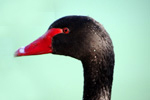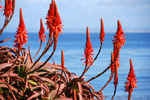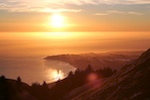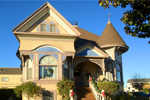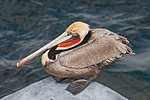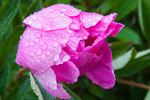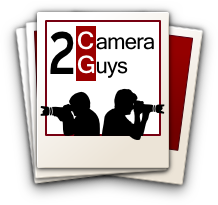Camera News
In Search of the Best Camera
Evan Powell — April 24, 2013
When I went to Japan last year I carried two cameras with me. One was the robust, high performance Canon 5D Mark III, a 22MP full frame DSLR that costs about $4000. The other was a small superzoom camera with a 24x zoom range, the Panasonic FZ150. That little camera weighs about 1.5 lbs, has a much smaller 12MP sensor as compared to the Canon, and it was priced at $450.
Technically, the Canon 5D is by far the better camera of the two. It's got a much larger sensor, higher resolution, and less digital noise in low light scenes. Its lens is optically superior. And it has a wider range of ontrols that the FZ150 does not have. But the funny thing is, all of my best photographs from Japan were taken with the Panny FZ150.
When it comes to taking the best pictures, the technical capabilities of your camera are almost irrelevant compared to its ease of use. If you cannot quickly and easily compose the picture you want in the viewfinder, it doesn't matter how much detail or noise you get in the final result.
In Kyoto I walked for miles every day through temples, shrines, gardens, outdoor markets, and city streets. On some days I carried the Canon 5D. When I walked long distances with that heavy beast strapped around my neck, I was constantly aware of the burden. After a day of hiking with it, even lifting the camera up to my eye to take a picture was real work. It has a beautifully bright viewfinder, no doubt about that. And having a good viewfinder is vital when you want to compose good photographs. But the weight and the relatively short zoom range were serious limiting factors on my creativity.
On other days I took the Panny FZ150 on my walks. Since it only weighs 1.5 lbs, I barely knew it was there compared to the Canon. That little camera gave me the freedom and energy to point, compose, and shoot much more successfully than did the Canon. Its long zoom range allowed me to take a variety of images, from wide angle landscapes to close ups, to isolated details at a distance. The creative freedom was immense compared to the Canon.
But what about picture quality? When I got home I discovered that the FZ150's 12 MP sensor that I thought might be a limitation was in fact no limitation at all. The Leica lens on this camera was sharp, and the 12MP files were easily large enough and detailed enough to make impressive 16x20 prints that look perfectly sharp. Nobody looking at these photographs has said, "wow, too bad you didn't have a higher resolution camera." On many of these images, the Canon 5D would no doubt have captured an incrementally better result. But the odds are, since the 5D is a great deal more cumbersome to work with over the course of a day, I never would have taken the pictures to begin with.
The point is this: everyone wants to know what the best camera is because they want to take the best photos possible. But if you are in a mobile situation, a camera's ease of use trumps its technical attributes every time. There are times when having a high performance camera is desirable and even necessary. And these days I pack a Nikon D800e, five lenses and a tripod with me when I want to do "serious" work in a specific location. And the D800e is my go-to camera for studio work. But the very last thing I would want to do is haul that rig with me on journeys of exploration or travel where I expect to be walking many miles a day. For exploring the streets of Paris, or Kyoto, or on African safari, a lightweight, low cost, easy to use superzoom camera will outperform a fancy DSLR every time.
Evan Powell
Editor
.
Technically, the Canon 5D is by far the better camera of the two. It's got a much larger sensor, higher resolution, and less digital noise in low light scenes. Its lens is optically superior. And it has a wider range of ontrols that the FZ150 does not have. But the funny thing is, all of my best photographs from Japan were taken with the Panny FZ150.
When it comes to taking the best pictures, the technical capabilities of your camera are almost irrelevant compared to its ease of use. If you cannot quickly and easily compose the picture you want in the viewfinder, it doesn't matter how much detail or noise you get in the final result.
In Kyoto I walked for miles every day through temples, shrines, gardens, outdoor markets, and city streets. On some days I carried the Canon 5D. When I walked long distances with that heavy beast strapped around my neck, I was constantly aware of the burden. After a day of hiking with it, even lifting the camera up to my eye to take a picture was real work. It has a beautifully bright viewfinder, no doubt about that. And having a good viewfinder is vital when you want to compose good photographs. But the weight and the relatively short zoom range were serious limiting factors on my creativity.
On other days I took the Panny FZ150 on my walks. Since it only weighs 1.5 lbs, I barely knew it was there compared to the Canon. That little camera gave me the freedom and energy to point, compose, and shoot much more successfully than did the Canon. Its long zoom range allowed me to take a variety of images, from wide angle landscapes to close ups, to isolated details at a distance. The creative freedom was immense compared to the Canon.
But what about picture quality? When I got home I discovered that the FZ150's 12 MP sensor that I thought might be a limitation was in fact no limitation at all. The Leica lens on this camera was sharp, and the 12MP files were easily large enough and detailed enough to make impressive 16x20 prints that look perfectly sharp. Nobody looking at these photographs has said, "wow, too bad you didn't have a higher resolution camera." On many of these images, the Canon 5D would no doubt have captured an incrementally better result. But the odds are, since the 5D is a great deal more cumbersome to work with over the course of a day, I never would have taken the pictures to begin with.
The point is this: everyone wants to know what the best camera is because they want to take the best photos possible. But if you are in a mobile situation, a camera's ease of use trumps its technical attributes every time. There are times when having a high performance camera is desirable and even necessary. And these days I pack a Nikon D800e, five lenses and a tripod with me when I want to do "serious" work in a specific location. And the D800e is my go-to camera for studio work. But the very last thing I would want to do is haul that rig with me on journeys of exploration or travel where I expect to be walking many miles a day. For exploring the streets of Paris, or Kyoto, or on African safari, a lightweight, low cost, easy to use superzoom camera will outperform a fancy DSLR every time.
Evan Powell
Editor
.
Comments (2)
Reader Comments(2 comments)
|
Posted Jul 9, 2013 6:21:59 AM
|
|
By Paul |
Post a Comment |
I am a photo journalist who has almost completely left my DSLR behind. I carry the FZ150 for 80 percent of my shooting and the Canon G1X for very low light event work. Not only am I not lugging around a big camera and several lenses, I am not disturbing people with the mirror slap click clack. My editor has never commented on the switch.
|
Posted May 19, 2013 11:25:07 PM
|
|
By Robert |
Post a Comment |
I think you're right. I have a SX50 from cannon & I can do a lot with it, I also have a dslr a57 from Sony with 4 lenses. I could imagine it would be a lot easier to use just one camera instead of having to switch lenses & miss a shot not to mention carrying everything around. But you do have advantages with the other too. I think it's how you take the images more than anything, tech stuff comes in second depending on what you're shooting & what you want. But I don't think super zoom camera's are cheap, that is if you're talking about the same type that I have with 50 times magnification, they are still a lot of money. Compared to a dslr though, yes, probably a bit less expensive, but still up there in price.
Post a comment
Commenting on this article is easy and does not require any registration. Your email address is necessary for you to activate your comment once it has been submitted. It will not be shown to other site viewers. 2 Camera Guys reserves the right to remove any comment at any time for any reason. Foul language is not permitted, nor are personal attacks. All comments should remain on topic.
